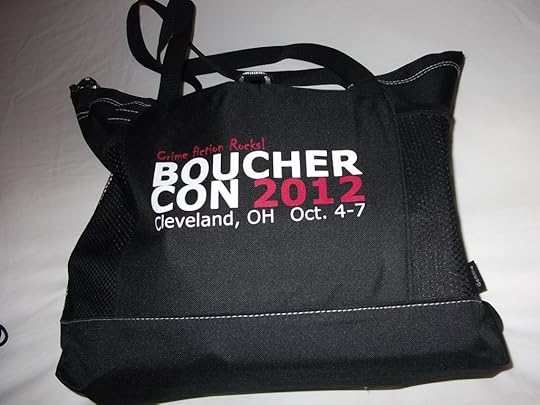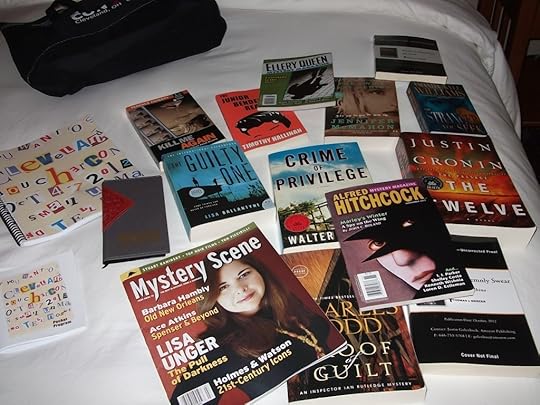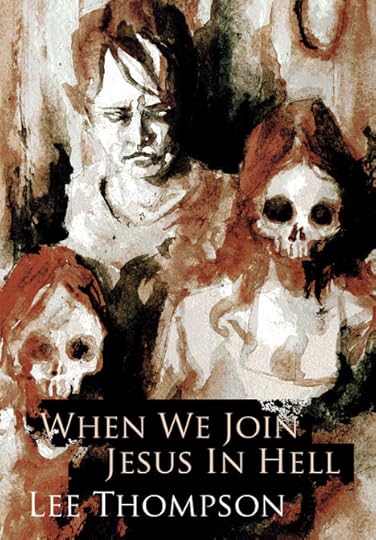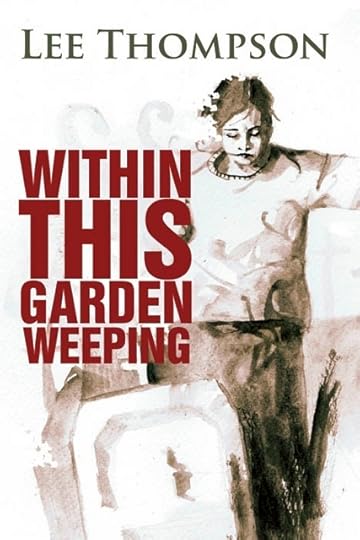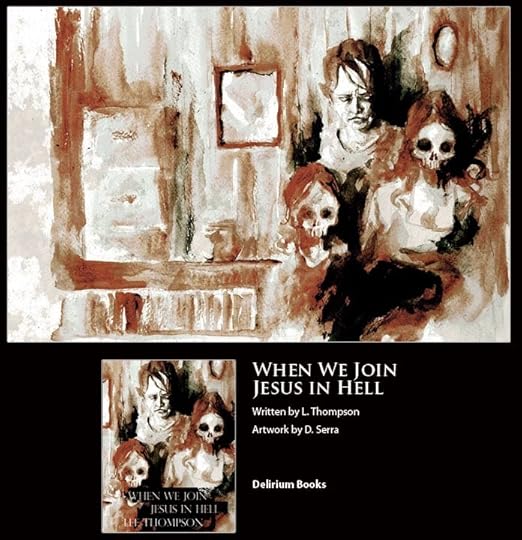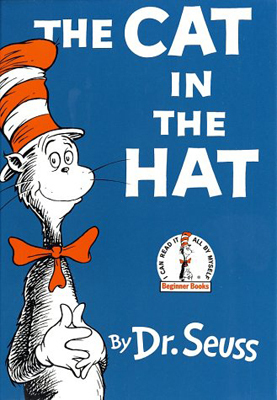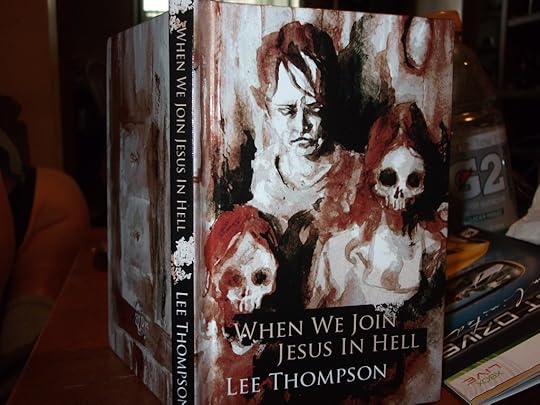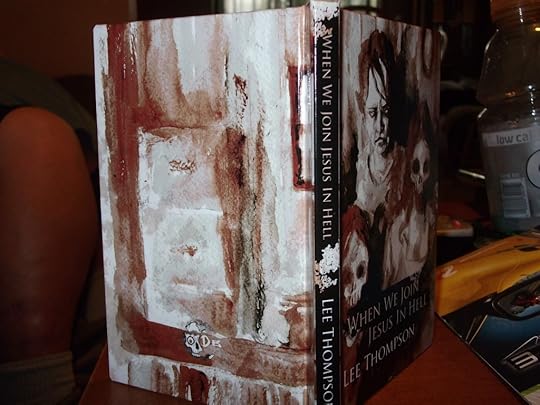Lee Thompson's Blog, page 14
October 5, 2012
Bouchercon Day 1
I’m at the World Mystery Convention in Cleveland, Ohio for the next few days! Got in the motel yesterday evening and walked around downtown Cleveland for a bit before going to register and get my name tag. Received this neat goodie bag, which I’ll carry around every day to fill up with people’s business cards and books I buy:
The gift bag was filled with tons of free ARCs, which will occupy the spare bed in my room until this trips conclusion. See:
As usual, since I enjoy drinking, I went to the bar right away. There I met a woman who wanted to drink my beard and then met fellow author Les Edgerton. Entertaining and insightful guy. He introduced me to a few other people (Dan O’Shea, who has the best jacket ever and who seems quite the character; Johnny Shaw, who for some reason reminds me of Joe Hill; Thomas Pluck, who seems like a real nice guy) then I hovered around Christa Faust of Hard Case Crime fame for a bit but didn’t get a chance to talk to her because I didn’t want to interrupt her when she was talking to other people.
Today I’m going to hit some panels, hopefully get to introduce myself to some heroes like John Connolly, Michael Connelly, Lee Child, etc., and learn some things. I’ll pick Les’s brain some more then go watch him, Thomas Pluck, and some others do a reading at the Wonder Bar.
Will take lots of pics today and share some things I learn from the panels!
October 2, 2012
The Next Big Thing
The lovely and gifted A.C. Wise tagged me for this whatchamajigger. Thanks Alison! I normally avoid things like this because I’d rather be working on a project than talking about it but a ten minute break won’t hurt.
Ten Interview Questions for The Next Big Thing:
1. What is the working title of your book?
She Collects Grave Nectar
2. Where did the idea come from for the book?
It’s part of my massive Division Mythos, and is a pivotal moment in Michael Johnston’s life. The initial spark came from an image, or snapshot of a scene, too, the way most of my work does. It came from my own fears of going blind and stumbling into that gray area between life and death, that single nanosecond where both are one before life ceases and death begins and a new life is rebirthed.
3. What genre does your book fall under?
Supernatural Thriller. But it’s not for lazy readers. My work doesn’t go over well with those types. That said, if you’re well-read and have a lot of imagination you’ll dig it.
4. Which actors would you choose to play your characters in a movie rendition?
For the main character, Michael Johnston, I’d pick Christian Bale if he was ten years younger because Mike Johnston is kinda like Batman. For the girl who collects grave nectar I’d pick the girl from The Lovely Bones movie because she’s kinda creepy in a good way, mostly due to her eyes.
5. What is the one-sentence synopsis of your book?
A Special Forces soldier with a hidden past meets an odd girl in a cemetery bordering our world and another and what she wants from him is soul-shattering.
6. Will your book be self-published or represented by an agency?
I don’t know. What do I look like, a mind reader?
7. How long did it take you to write the first draft of your manuscript?
A rough guess: three months of heavy drinking. I’m still working out all the pivotal moments.
8. What other books would you compare this story to within your genre?
Tom Piccirilli’s Shadow Season since my Special Forces protagonist is blinded and faces incredible entities as well as a profound mystery. Peter Straub’s novel Koko since there’s this complicated and creeping dread. And Stephen King’s Dark Tower series because it’s a mixture of many things both concrete and surreal.
9. Who or What inspired you to write this book?
Michael Johnston’s character arc runs through most of the thirteen Division Mythos books and this one was inspired by how little of his past he’ll reveal to other characters, even to his best friend in the series, John McDonnell (The narrator of the second Division trilogy).
10. What else about your book might pique the reader’s interest?
It has one zombie, one ghoul, and one vampire who walk into a bar full of politicians?
***
Include the link of who tagged you and this explanation for the people you have tagged.
The mighty A.C. Wise tagged me. Authors I’m tagging because I think they are amazing like A.C. Wise:
Rules of The Next Big Thing
***Use this format for your post
***Answer the ten questions about your current WIP (Work In Progress)
***Tag five other writers/bloggers and add their links so we can hop over and meet them.
Be sure to line up your five people in advance.
October 1, 2012
Tuesday’s Training: Mistakes
Far better is it to dare mighty things, to win glorious triumphs, even though checkered by failure… than to rank with those poor spirits who neither enjoy nor suffer much, because they live in a gray twilight that knows not victory nor defeat…
Theodore Roosevelt
I can accept failure, everyone fails at something. But I can’t accept not trying…
Michael Jordan
Most of the first half of my life (I hope it’s only the first half) has been riddled with mistakes, setbacks and failures. Every successful lunge forward is the result of some mistake I learned from previously. Some people have taken great delight in the failing side of the equation as I’m sure you have people around you who love to see you fail. But that’s only because they like to make it about them, how they would have done it smarter, or faster, or better. Only they never seem to take a risk with anything. Cowards are the first to laugh and criticize.
Being aware of what went wrong helps us learn and move toward the life we want (though even that life will never be perfect. What is?)
My first novel came out one year and four months ago. I’ve written and sold a lot of fiction since then and I’ve made some mistakes along the way that I’ll share with you here. The things I learned I couldn’t have learned without fumbling the ball, without falling from the wall I was climbing to see what lay on the other side. No regrets here. This is life. We only get one (that we can verify.)
Mistake #1: I started with the Division Mythos, a thirteen-book story. This could be the biggest mistake I made as a new author. Most people start with a standalone book, or at most, a trilogy. I’d written three books that were part of a thirteen book epic journey. The books were not in order: Before Leonora Wakes is the first in the first trilogy, Red Piccirilli’s. Nursery Rhymes 4 Dead Children is the first in the second trilogy, John McDonnell’s. Iron Butterflies Rust is the first Frank Gunn story. But I hadn’t known when writing each that they were all pieces of a puzzle until I’d finished them. My subconscious is always way ahead of me and makes me feel like a laggard so often. So I hurried to write others in the series, but I didn’t write them in chronological order. I know I should have but the stories didn’t come to me in that order. And instead of stopping and writing some standalone novels to build my fanbase, I pressed on with the Division Mythos because it continued to burn inside me, and still does. And luckily I’ve written the other stories in the last year and four months to fill in the gaps so that when my next two books are released the first eight books will be out there and can be read in order. Phew. Big mistake.
What I learned: I learned several things from that big mistake. One is that I am prolific. I can write a few hundred thousand words, and write them well, in a year and a half. And I can do it only writing a half hour a day, sometimes even skipping writing days because I just want to read or have other people’s stuff to critique. The second thing I learned is that I don’t control my muse, my muse controls me. I can’t write whatever I want. I have to write whatever project is constantly on my mind and I can’t move on to anything until I finish said work. I don’t see that as a bad thing though. The third thing I learned from the big mistake, and linked directly to being prolific, was that I can do like some of my heroes and write under a pen name. I’m going to up my game to write in the morning and at night (one hour a day total) and write four novels a year under four different names. Partly because I want to write in multiple genres, partly because by the time I’ve finished a WIP I already have ideas for a few more novels. I want to write as many of them as I can before I die, which could be tomorrow if I have a real bad day. So, with the pen names I’ll write each novel as a standalone, shoot for a broad and epic and moving story in 100,000 words. Piece of cake. Plus the muse can take me wherever it will because writing under four names in four genres I’ll never get bored. (I hate getting bored.)
Mistake #2: When I started I made the mistake of believing that writing is easy, even though I’d been a horrible student who didn’t know the difference between to, too and two, who then became a frustrated, uneducated and devout worshiper of Jack Daniels. Writing in my late twenties I thought you just write a story and then you sell it and hey, people are going to see your genius. I’ll tell ya, I’ve hung around a lot of creative types and we can easily think we’re Shakespeare or Hendrix or van Goh without ever creating anything that genuinely moves someone else on a physiological, let alone, a spiritual level.
What I learned: Eventually, after you’re writing and subbing stories for years without selling anything for cash, you have to face the facts that you’re not that good. So, I said, “What the hell am I doing wrong besides thinking I’m already good?” So I went out and studied the craft, hand-copied favorite novels, met some great friends who read all my work, asked questions of pros, read tons and tons of novels, read all kinds of genres, looked at my own life and the lives of those around me for material and emotions to draw from, did all kinds of things except sell my soul to the devil on layaway (hey, there’s a short story I’ll be writing this week). All of this searching and striving helped me a lot. I realized that even as much as I learned in a couple years of cramming was still only the tip of the iceberg. I think the greatest lesson I learned from it was that writing isn’t easy, that there is so much to learn and understand, and that there comes a point with each book where I have to set myself aside and bring my whole life and everybody I’ve ever known, and everything I’ve ever seen and splash it against the page. And then I learned to shape it with the craft, the What Makes Good Writing: which is this… get out of the way of your characters if they’re interesting.
Mistake #3: To aim high. I wanted to make a living at writing. That was my idea of aiming high. It’s really not that ambitious. With work and dedication and a little talent I think anybody can do this after they’ve put in ten or fifteen years.
What I learned: Wanting to make a living as a writer isn’t that important to me anymore. I already know I’ll be able to do that, and even if I couldn’t I have a more important goal now, and one that would make my living through writing mute. Now what have I learned? I want to write something that will move thousands upon thousands of people. I think I pulled it off with the novel I just finished. I think it is literature and more human than anything I could have ever written. I learned that I didn’t aim high enough to begin with but that was probably because I doubted any talent I had.
Mistake #4: I am antisocial.
What I learned: Try to be less antisocial.
The great things about mistakes is that they teach you about yourself.
As all things Real Life, this applies to the characters we create, too. Story itself is a moving picture of failures and a striving for wrongs righted. What is a story without a character making a choice and facing the repercussions of a bad move? Or someone else making a choice that affects them and our character having to make a choice in turn to return things to normal?
Simple. It’s all so complexly simple.
What mistakes have you made and what have you learned from them?
P.s.– Did you hear that the super awesome Jack Ketchum read my latest standalone from Darkfuse? Here’s what he said. Go grab a copy already. And go grab a copy of one of his books.
“WHEN WE JOIN JESUS IN HELL is as crazy as its tormented protagonist. Hard as nails.”
– Jack Ketchum
September 30, 2012
Blurb from the mighty Jack Ketchum
“WHEN WE JOIN JESUS IN HELL is as crazy as its tormented protagonist. Hard as nails.”
– Jack Ketchum
I figure it never hurts to ask a hero if they have time to read something. And I like when they say they won’t blurb it unless they love it because I’m taking that same route. Anyway, Jack Ketchum read my latest book from Delirium, WHEN WE JOIN JESUS IN HELL, and I’m glad he enjoyed it! Thanks for taking the time Dallas!
So go grab a copy and give it a chance. The hardcovers are sold out but you can snag it on all the digital readers (Kindle, Nook, Kobo, iPad, etc.) and add it on Goodreads.
September 28, 2012
Within This Garden Weeping
Still recovering from his brush with the magical, Red Piccirilli’s parents move them out of town and down a dead-end road where they feel things will be safe and quiet for their son. But when a strange old man with an agenda visits Red’s mother, the boy is quickly thrust into another world. He’ll learn from a broken god how to harness the incredible power that has been lying dormant since his last encounter with Glory on the Green…
Within This Garden Weeping (the 2nd Red Piccirilli book) will be released digitally before the end of the year. Very exciting! It also features great artwork from Dani Serra. I love that guy! I have an idea for a graphic novel that I think I’ll run by him one day to see if we can team up. Yeah. Go team!
This is much darker than the first book, Before Leonora Wakes, but is crucial in Red’s character arc in the Division Mythos, and it also sets things up nicely for the third book, The Collected Songs of Sonnelion.
With my Historical/Thriller novel The Lesser People finished and in the hands of my buddies Shaun and Kevin, I’m working on a new novella called Gossamer, and finding the pivotal moments for the Michael Johnston novel She Collects Grave Nectar, which will be a badass book in the Division storyline.
Also check out A.C. Wise’s post called The Next Big Thing. I’ll be participating in that next week and talking about She Collects Grave Nectar! Neat! Thanks, Alison! And thanks to everybody who has dove into the Division Mythos and trusted me with your time and money. You all rock!
September 25, 2012
Official release day of new novella and a review
WHEN WE JOIN JESUS IN HELL was officially released today on all the digital buggeroos. Grab it for your Kindle, Nook, or from Kobo. I don’t see it yet on Deisel or iTunes but it should be up in the next couple days.
I also received a new review on it from the wonderful Jennifer at Book Den.
Feel free to add it on Goodreads and an honest review there or Amazon or B&N would be great.
Hoping everybody is having a great week!
P.s.– You only have five days to catch up on my free serial novel THE COLLECTED SONGS OF SONNELION before it’s taken off the web!
September 24, 2012
Ah! Finished a new novel!
After a few days of battling fever and shivers I woke up tonight feeling like my normal self. I used it to my advantage by finishing my WIP The Lesser People. Then I did my read through and I am overwhelmed by all the emotions that writing this novel has brought. It’s my goal to write a book that can display the gamut of human emotions, and I think this is as close as I’ve come so far. I can’t say I’ve ever been this excited about the prospects of a single book.
I’ve sent it to my readers and to my publisher, though I think this will be a novel that will have to come out under a pen name since it’s not Horror. And I’ve decided that if it’s not a book that will set well under my publisher’s banner then I’ll query agent Ethan Ellenberg who was very encouraging a few years ago, back before I’d ever sold anything. He was a big help in what I needed to work on, and after I applied some of his advice I started selling my fiction, so I hope he loves this novel. We’ll see.
Happy reading and writing week!
P.s.– You only have until the 1st of October to catch up on my FREE serial novel THE COLLECTED SONGS OF SONNELION.
And give my heartbreakingly brutal novella WHEN WE JOIN JESUS IN HELL a try. It just came out through Darkfuse this past week.
September 18, 2012
Tuesday’s Training: Using a Pen Name
Tons of famous writers have used pen names for various reasons. Some writers’ who have used pen names, or these are their pen names: Dr. Suess, Ayn Rand, Lewis Carroll, George Orwell, Stan Lee, Stephen King, Ed McBain, Donald Westlake, Dean Koontz, Douglas Clegg, Joseph Conrad, Mark Twain, O. Henry, Robert Jordan, Lee Thomas, Max Brand, Benjamin Black, Robert Heinlein, Isaac Asimov, John Le Carre, Anne Rice, James Joyce, Joyce Carol Oates, Nora Roberts, Lawrence Block, Harlan Ellison, Michael Chrichton…
You may be for or against pen names for whatever reason. I didn’t like the idea of them until recently. I felt that we should have our name on all of our work, but the more I learn the more I see why pen names are useful. I’ll list several of the reasons I’ll be using a few pen names…
#1. I’m very prolific…
I only have to write about a half hour a day to knock out two novels and two novellas a year. Easily. Some days I don’t write at all because I’m tired or lazy or life gets busy or I just want to read. But when I get back to the keyboard I’m flying. Could be because of all the dexterity I developed through years of guitar playing but I am an extremely fast typer. Plus I have about the next eight book ideas lined up, with some of the pivotal moments for each, so I can just bridge the gaps between those pivotal moments and have a new novel done in no time. In the last two years I’ve written and sold the following novels (Nursery Rhymes 4 Dead Children, The Dampness of Mourning, The Collected Songs of Sonnelion) and novellas (Iron Butterflies Rust, Immersion, Down Here in the Dark, When We Join Jesus in Hell, As I Embrace My Jagged Edges, and Within This Garden Weeping). See, I need more names. That’s too much for one person to do. And the more I write and the more my name gets out there the more time I’ll have to write. I can’t fathom writing three hours a day every day. I know I’d knock out a library of books in a decade. But hell, that’s what will probably happen since writing is therapy, and it’s a compulsion, and it’s a challenge, and it’s fun.
#2. I want to write in more than one genre…
I read widely and want to write widely. If somebody reads one of my more touching novels that I plan to write and then they went and read one of my Dark Fantasy novels they’d be upset. And I couldn’t blame them. We’re automatically tattooed with certain emotions by a writer and their work. For example, I’m nearly finished with a Historical/Family Saga/Thriller novel called The Lesser People. I know that it won’t sit well under the Darkfuse (or any other small press roof, though I’m going to let my publisher read it to see what he thinks), so more than likely I’ll be looking for an agent for that book, and I’ll be selling it under a pen name. I also have a sad and touching novel I’m going to write called Shine Your Light on Me that isn’t Horror or Crime, again more in a Family Saga/Price-of-Fame scope. And I have a few YA novels that I want to write that will be kinda edgy, gritty, and very realistic. Plus I want to pen some straight-up Crime fiction like some of my heroes. And I have a Western trilogy called Past Hard Seasons that I’m going to tinker with and modernize to see what I can make of it.
#3. Well, I don’t have a third reason. But those first two reasons are enough to warrant some fake names to write under.
Reasons other professionals have used pen names (besides using one for the same reasons I am):
They didn’t like the sound of their real name…
They didn’t want their family to know what they were writing…
They were paranoid and didn’t want people to know their real name…
They use a lot of real-life material in their novels and want to protect themselves from judgment…
To disguise their sex…
The list goes on.
It’s up to you to decide if you need or want a pen name. I’d follow the more ‘need’ side of it. My reasons show me I need a few. Follow your heart and trust your gut.
***
My standalone novella WHEN WE JOIN JESUS IN HELL was just released on Kindle (other digital formats out Sept. 25th). Go snag a copy! It’s a dark and harrowing tale of love, loss, revenge, and over-compensation. My hero Tom Piccirrilli read it and said, “Lee Thompson knows his horror-noir. He fuses both genres together in the turmoil of terror, tragedy, blood, guilt, and lost chances at redemption.”–Tom Piccirilli, author of THE LAST KIND WORDS
You can also read my FREE serial novel THE COLLECTED SONGS OF SONNELION until the end of the month. Then it’s gone until it comes out in book form one day.
WHEN WE JOIN JESUS IN HELL released!
Received my author copies of WHEN WE JOIN JESUS IN HELL. They’re very sweet and have some awesome artwork by Dani Serra. Mailing out copies today to a couple of my heroes and to my buddies who have been there for the whole long haul. This book is short and powerful. A look into love, loss, revenge, and overcompensating for what has already been lost. I like it.
It also came out on Kindle! So grab a copy for your Kindle quick, read it, review it, spread the word! It should be out in other digital formats soon!
September 11, 2012
Tuesday’s Training: Tone
You can’t fix boring– Jesus
(didn’t really say that, but he should have!)
Ah, the beauty of wonderful tones. We dig them by our favorite guitarist, in the timbre and resonance of our favorite vocalists, in the bright relief of late autumn, and unsurprisingly in the books by our favorite authors.
We do not want bland, run-of-the-mill music, scenery or characters. We want something that stirs our very spirits. And as creators I think it’s important to dig deep and find our tone for each story as early as possible. There are definitely wrong tones for a piece, and a great story can be made mediocre by something so fundamental. Who would have thunk it, right? But imagine a classic like The Grapes of Wrath being written in the tone of a whiny narrator. It would get old quick. Imagine Edgar Poe’s classics written with the tone of a frustrated and bored father. It wouldn’t be right focus-wise or in building atmosphere and conflict for what he set out to do.
I think that is a revelation. Don’t write every story from wherever you are in that stage of your life–a frustrated and bored father, an overworked wife and mom, a happy drone, a rising force in your corporation, a beloved family comedian–write each story from the place that best suits the character’s attitude, goals, frustrations and convictions.
What exactly is tone? It’s a huge part of an author’s voice and approach to a specific story. It, like many aspects of well-written story, is directly linked to an author’s word choice and how specific they are, what details they share and those they don’t. And most of all, I believe it’s the consistent voice of the narrator’s view of the story he’s telling for the length of the work. The character’s attitudes sets tone, which can also help you judge how interesting of a character you have created.
If we’re writing something very personal, that has recently happened, our tone can be bitchy or whiny or angry. You might think that it adds fire to the fiction, but writing from an open wound about something that just happened without any objectivity is dangerous and a lot more boring than you’d think.
Best to let yourself cool for a while, to gain some distance and perspective, before bringing the fiery stuff to your work. Don’t write as an embittered victim. Write from the place where you’ve acknowledged and accepted your part of any painful experience, and write from above and outside the experience itself, perhaps as if it had happened to one of your best friends. Yeah, do that.
Likewise, hardly anybody wants to be preached at. Learn some stuff, possibly, but not be beat in the head with your agenda. If you’re in the story more than the story is in the story… Cut! Step back. Reassess. Keep the story moving at its natural gait, don’t make it syrup with your tacky personal injections every other paragraph.
I had a talk recently with my publisher that made me think about tone in climatic moments as well. Not all characters will view those intense emotional actions/reactions the same way. Some will move without thinking, some will overthink, to some there isn’t a brisk, snappy play of events (displayed as shorter sentences) but a speeding-up of time, a running together of everything that came before that moment and the chaos that swirls violently around the axis of said climatic moment. Let your character dictate the tone and you’ll be all right. Try to force a tone on a character that doesn’t jive well and you’re in for trouble.
This all really goes back to what I believe is the backbone of great fiction: a character who feels strongly about something surrounded by other people who feel strongly about stuff; inner and outer conflicts. Pretty simple. If your character doesn’t feel strongly about himself, where they grew up, how their parents raised them, about their job, about their wife or husband or kids, or religion, or politics, or how their dreams never manifested into reality, I’d lay money the tone of your novel will be all over the place. And when something is all over the place in tone, it diffuses the main thread (your main character’s story) into something scattered and vague. Don’t be vague. Vague is not a good tone.
Go study how the professionals establish tone through characterization.

